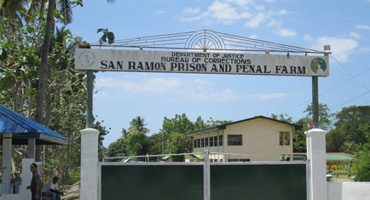 Cascading the fruits of R&D to the countryside to change the lives of people is the ultimate dream of any researcher. It takes a lot of effort and resources though, to disseminate or promote technologies or innovations to change mindsets and ways of farmers, encourage them to adopt these, and finally help them increase their productivity and income.
Cascading the fruits of R&D to the countryside to change the lives of people is the ultimate dream of any researcher. It takes a lot of effort and resources though, to disseminate or promote technologies or innovations to change mindsets and ways of farmers, encourage them to adopt these, and finally help them increase their productivity and income.
For livestock and poultry, it is well recognized that this subsector contributes significantly to the growth of the agricultural sector. In fact, livestock is not a mere likelihood, but a livelihood, a lifeline, and a lifestyle.
In the Zamboanga Peninsula, a project titled Evaluation of the Sustainability and Profitability of Zampen Native Chicken (also known as ‘Joloano’) Production as Source of Livelihood in Rural Communities is underway. The project is being led by the Western Mindanao State University (WMSU), through Dr. Teresita Narvaez, Western Mindanao Agriculture and Aquatic Resources Research and Development Consortium (WESMARRDEC) Director. 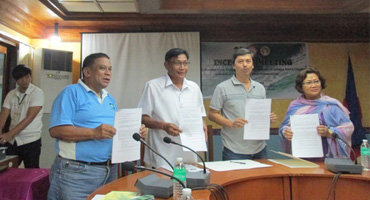
The project adopts the technologies and protocol developed by WMSU on management of the Joloano native chickens from hatching, day old, hardening, and up until the birds are ready for breeding; selecting and purifying the strain; and developing the health protocol and feeding management system.
With these science and technology-based interventions at hand and the promotion being made about the potentials of Zampen native chicken, the demand for the strain to meet the local needs in Zamboanga Peninsula has grown, even in other provinces and regions of the country. The project has created awareness and instilled appreciation among local government units, the Department of Agriculture, academe, and even NGOs in Zamboanga Peninsula, where for many years, this resource of native chicken has not been given importance. 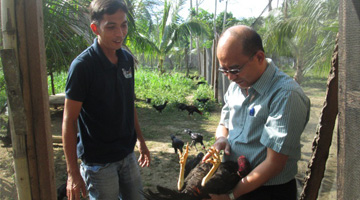 For the inmates of the San Ramon Penal Colony, livestock is a lifeline—a link to the outside world that will eventually help them start over with their lives. The penal colony is 30 to 45 minute-ride from the city and adjacent to the project site at the WMSU campus in San Ramon, Zamboanga City.
For the inmates of the San Ramon Penal Colony, livestock is a lifeline—a link to the outside world that will eventually help them start over with their lives. The penal colony is 30 to 45 minute-ride from the city and adjacent to the project site at the WMSU campus in San Ramon, Zamboanga City.
Encouraged by the livelihood potentials, the management of the penal colony, with the support of the Bureau of Corrections (BUCOR), is implementing a small development-oriented initiative to share the results of R&D on native chicken production through a livelihood project. The project is using science-based interventions to benefit the inmates or the “Kosas,” who are about to complete serving their sentence within one to three years. The beneficiaries are inmates who have been sentenced and detained for robbery, murder, kidnapping, and other crimes. Most of them came from the National Bilibid Prison in Muntinlupa. Through this project, the participating inmates will have the knowledge and skills to help them start afresh once they are finally released.
Ultimately, livestock is a lifestyle for those inmates who choose to go by it. The cooperators are trained about the improved ways of raising native chicken. However, it is not surprising that most of these inmates are already able, very much trainable, and enthusiastic because they had experienced raising chicken (gamefowls, range chicken, or broilers) in their provinces. 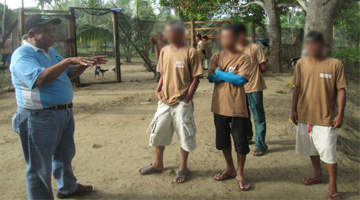
The inmates will get a monetary share from the stocks sold initially to WMSU, but they will be required to market the stocks produced from the penal colony. When the time comes that they are about to be released, the project will make arrangement that they will be provided a starter package of breeders, which will serve as their “pabaon” or parting gift, for them to be able to start a new life should they prefer this option.
The WMSU researchers will make sure that through the package of technology developed, the stocks sold as breeders will meet the standards set by the project for the market. This will assure the quality in terms of predictability in performance as well as sustainability in supply. The livelihood project with the inmates is expected to address the production of stocks to satisfy the growing demand for native chicken. 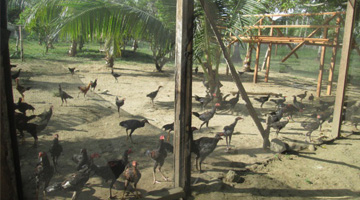
The project is a component of a native chicken program being supported by DOST-PCAARRD entitled “Purification, Improvement and Sustainable Utilization of Native Chicken Strains in Bohol, Bicol and Zamboanga Peninsula.”
With the project, the “ka kosas” of San Ramon Penal Colony, while still detained, can already breathe the air of freedom and prepare for a better life through science and technology.
